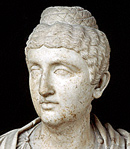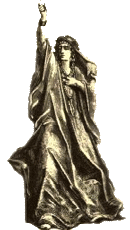First Christians – fornicators?
"It is reported commonly that there is fornication among you, and such fornication as is not so much as named among the Gentiles."
– 1 Corinthians 5.1.
1 Corinthians, arguably the earliest letter of Paul, complains that some of the first Christians had taken the apostle's "freedom from the Law" as a license for libertinism.
But "Paul's attack on the sexually wayward Corinthians" may in reality be a proxy for 2nd century Orthodoxy's attack on the promiscuous Carpocratians. Carpocratus was said to have been a follower of Cerinthus.
"They practise magical arts and incantations; philters and love-potions ... They lead a licentious life ... they maintain that things are evil or good, simply in virtue of human opinion. They deem it necessary, therefore, that ... souls should have experience of every kind of life as well as every kind of action ... doing all those things which we dare not either speak or hear of, nay, which we must not even conceive in our thoughts, nor think credible, if any such thing is mooted among those persons who are our fellow-citizens."– Irenaeus, Against Heresies, 25.
First Christians – low-lives?
"Neither fornicators, nor idolaters, nor adulterers, nor homosexuals, nor sodomites, nor thieves, nor covetous, nor drunkards, nor revilers, nor extortioners will inherit the kingdom of God. And such were some of you."
– 1 Corinthians 6.9-11.
* Hence the cry of the expiring Jesus: "My God, my God, why has thou forsaken me?" (Matthew 27.46).
Dressed for God
Augustus as High Priest
Devotional head covering was a Roman custom – as it was with the Jews.
A Jew dressed for G–D.
But male headcovering was not acceptable for a follower of Paul.
"But we all, with unveiled face, reflecting as in a mirror the glory of the Lord, are being transformed into the same image from glory to glory, just as by the Spirit of the Lord."
– 2 Corinthians 3.18.
Paul's taboos
"And every woman who prays or prophesies with no covering on her head dishonors her head – she is just like one of the 'shorn women' ... it is a disgrace for a woman to have her hair shorn or shaved, she should grow it again!"
– 1 Corinthians 11.5-6.
In the late Republic and early Empire Roman women's hairstyles had become increasingly elaborate.
Blond wigs were fashioned from the hair of captive Germans. Bun and chignon had given way to creations not seen again until the court of the French king Louis XVI.
It was all too vain and raunchy for the Christians.
St Paul and Women – the weaker vessel?
"In the last days ... men shall creep into houses, and lead captive silly women laden with sins, led away with divers lusts."
– 2 Timothy 3.1,7.
Silly women, easily tempted into lust when fruit is available
The prophetess – dangerous
In the sagas of the Jews all but a handful of the prophets had been men. The new Christ-cults broke from this tradition, although the New Testament marginalizes the practice. Phillip's daughters get a single mention.
"We reached Caesarea and stayed at the house of Philip the evangelist, one of the Seven. He had four unmarried daughters who prophesied."
– Acts 21.8-9.
"Then spoke the Lord to Paul in the night by a vision, Be not afraid, but speak, and hold not your peace, for I am with you, and no man shall set on you to hurt you: for I have many people in this city."
– Acts 18.9,10.
The female apostle Junia of Romans 16.7 was arbitrarily changed to Junias, an otherwise unknown male name, in many orthodox manuscripts.
|
Christian apologists love to condemn pagan Corinth as a city of rampant immorality. They will not be slow to tell you that the Greek verb korinthiazomai, a derivative of the city's name, means to fornicate. But the truth is that Corinth was a bustling port with a large, transitory population. In that sense, its notoriety was no worse than any other port city. Corinth, however, was claimed as a bridgehead for Paul. The apostle's two seminal letters, supposedly sent to the fledgling congregation in the city, reveal a bewildering variety of opponents and present a veritable anthology of his pastoral guidance and theological diktats. The historicity of the super-apostle, vexed by troubles on all sides, warily asserting (re-asserting?) authority over "his" church by stern letters, is not compelling. Was it Corinth that was especially in focus or "all that in every place call on the name of Jesus Christ"? (1 Corinthians 1.2). Was the author really a missionary called Paul or are the hands of later editors revealed in the odd discontinuities (six "Now concerning ..." re-starts in 1 Corinthians alone)? Are we really dealing here with authentic letters from a hard-working soldier of Christ or rather, an accretion of polemical exchanges and negotiated harmonizations (Paul baptized, did not baptize and could not remember if he baptized! (1 Corinthians 1.13–17). An inconvenient truth for those who wish to believe the holy fantasy is that NOT the "teachings of a historical Jesus" but the so-called epistles of Paul developed the dogmas and precepts of the Church. Could one man be that smart?
How many letters make two?
The earliest collection of "Paul's correspondence" was a short recension, the Apostolikon, made available by Marcion, a 2nd century bishop of Pontus. Marcion was accused by his rivals with intruding dualistic-gnostic ideas into the texts. But the charges flow both ways: Catholic editors, when deeming it prudent to accept Paul into the community of the saints, could have sanitized the Pauline corpus of dangerous ideas, even as they neutered Paul into a regular team player in the fantasy called Acts of the Apostles. One indication of a 2nd century date of origin for the letters is anachronistic reference to persecution (1 Corinthians 4.12; 2 Corinthians 4.9; 12.10), scarcely tenable in the 1st century. 1 Corinthians 16.1-11 may well have been a "fund-raising" letter in its own right, subsequently appended to didactic material at a later date. The second Corinthian letter, even more than the first, has abrupt changes of style, tone and content. In all probability, 2 Corinthians 6.14 - 7.1 is the letter calling for "separation from fornicators" referred to in 1 Corinthians 5.9. The last four chapters of 2 Corinthians are probably the "severe" letter referred to in 2 Corinthians 7.8. Without doubt, an editor has been at work, organizing the available material into approved guidance for the faithful. Confirming the questionable authenticity of the two missives are the restrained salutations. 1 and 2 Corinthians close with little more ado than "All the brethren greet you. Greet you one another with a holy kiss." There are none of the usual "named" confederates and this is to a congregation with whom – supposedly – Paul has lived on intimate terms for eighteen months!
Factionalism in the ranks: Corinthians – or Cerinthians?
On the other hand the shadowy presence of 2nd century factions is to be discerned within the Pauline corpus – Cerenthians, Docetists, Marcionites, Ebionites, Nazarenes, Elchasai. Was an original Pauline "Corinthian" letter actually directed towards a group of heretics, the followers of Cerinthus? It is often said that Paul had within his sights "Judaizers", though he never uses the word himself – adversaries are referred to only obliquely ("Are they Hebrews? So am I.") and never as specific sectarians. The same passages could be directed at the so-called "re-Judaizers" of the 2nd century, those who took issue with the Marcionites and kindred Gnostics for their rejection of the entirety of Jewish scripture. It appears that some, at least, of Paul's opponents denied the resurrection of the dead:
A distaste for intellect: the priestly imperative
The writer has nothing but contempt for Greek intellectualism. As the claimant to supreme spiritual authority Paul condemns rational thought as "puffed up" (1 Corinthians 4.6,18; 8.1), an anti-intellectualism still found in the cheap jibes mouthed by evangelicals about academic "arrogance". With relish Paul inveighs against "Greek wisdom" and exalts the quixotic notion of a "spiritual awareness", which he insists excels the rationalism of "natural man". His theology is a shameless defence of priestly authoritarianism, masquerading as the outlandish notion that the Christian collective forms the "body of Christ."
Those with the greatest gift – apostles – form the leadership, with Paul foremost among them. He claims for the new "body of Christ" all the titles, privileges and promises that Jewish scripture had previously bestowed on Israel. The Lord is King but, having been "called to serve", the voice within the epistles speaks for God and that God has ambitions which betray more earthly purposes. All is to be controlled by the hierarchs. The Saints, says Paul, are the "stewards of the mystery of God" (1 Corinthians 4.1). The present world is "passing away" yet even so, believers are the new elite. He warns the Corinthians that he "might put you to the test, whether you are obedient in all things" (2 Corinthians 2.9). He even anticipates the notorious ecclesiastic courts set up by Emperor Justinian centuries later. "The saints will judge the world ... Do you not know that we shall judge angels? How much more, things that pertain to this life?" (1 Corinthians 6.2-3); they most certainly must not turn to pagan magistrates to arbitrate in disputes between brethren. Paul's indignation will seed centuries of corruption and abuse by a clergy set beyond secular law. The cardinal Pauline doctrines of "justification by grace" and "salvation by faith, not works" are not anywhere to be found in the gospel stories. The simple, albeit nebulous, notion of "The Coming of the Kingdom of God" which permeates the tale of Jesus is overshadowed by the constructs of Pauline theology. The Saviour is the focus but not the wellspring of the Pauline message. When higher endorsement is needed for Paul's novel ideas they are drawn, not from a perambulating godman of Galilee that Paul never knew, but from the prophets of Jewish scripture. Thus even when speaking of salvation Paul quotes not Jesus but the Old Testament prophet Isaiah:
Could it really be the case that contemporaries of the "historical Jesus" – even the very witnesses to the godman's mighty deeds, required denouncing as in error? The reality, of course, is that primitive Christianity was a milieu of fractious sectarianism, busily engaged in mutual vilification and proscription. In the corpus of Pauline epistles we have the "final communique" of the triumphant party and a much redacted compendium of approved theology and pastoral guidance.
Sex and the City
Paul uses the scandal as a foil to condemn all "fornication" and there is no Christian forgiveness here. The saints are to keep separate from fornicators and the wicked are to be "put away" (1 Corinthians 5.13). In Romans, Paul confesses the torments of his own "concupiscence" and makes a rhetorical appeal for "delivery from the body of death."
As befits a church bent on mass recruitment rather than fidelity to principle, if members of the brethren already had pagan spouses, husbands and wives were, it seems, "sanctified by their partner" (1 Corinthians 7.14) – a remarkable compromise to the harsh precepts of "justification". Paul had little knowledge of or empathy for Greek culture and dismissed Greek religion as mere idolatry. But the pragmatic evangelist clearly had his sights on the children of "mixed" marriages, anticipating the Jesuits by more than fourteen centuries – "give me a child until he is seven, and I will give you the man".
Christian conduct - the Pauline taboos To distance themselves from "Jewish practices" Jewish-Christian males were directed to give up praying with a mantle over their head.
Headcovering symbolized female submission to male authority and Paul was content with this part of the Jewish legacy. He even provided his own remarkable justification:
The threat of free spirits Divine Grace was a "gift" from God. Paul recognized a variety of such "gifts" including healing, the working of miracles, the discernment of spirits, even sexual continence. But there is no freedom here – "gifts of the spirit", it seems, are for the edification of the church, not the individual. Most assuredly, the individual is NOT at liberty to follow his own fancy (as did the Quakers, for example, with their "inner light" in a later age). Spontaneity was to be restrained by obedience to Christ under the direction of the church and its hierarchs.
Paul's gift of choice for the brethren was prophecy, a gift that once had been a regular dispensation from the Almighty to the Jews but not vouchsafed for centuries. No matter – the ancient Jewish prophets could be repurposed for the Christian cause, their every utterance pre-figuring and anticipating the Lord Christ Jesus. Prophecy, said Paul, was "a comfort to men" and of direct benefit to the church. It was by reinterpreting ancient prophecy – not the presentation of tangible evidence – that the Christians "proved" the existence of their "historical Jesus" – and still do!
Such spontaneous "outpourings of the Spirit" and new revelations from Heaven were not to be countenanced in a disciplined Pauline church. The battle with the soothsayers reached its climax in the second half of the 2nd century. Montanism even attracted into its ranks Tertullian, the "father of Latin theology" who defected from the Catholics because of their lax ways. In the 3rd century Montanism was marginalised as a heresy but it lingered on for centuries.
Keeping women in their place The dispute over the role of women in the early church occurred precisely because in a number of Christian sects women had a role, often an important one, such as prophetess or apostle. The challenge went wider than Montanism. Female leaders were common in the Gnostic Christian sects which most vociferously challenged Catholicism. Foremost of them was the church of Marcion. Infamously, in the orthodox Pauline church, women were to have no voice:
How is it, then, that "Paul" can be on both sides of the "women's rights" issue? Precisely because the corpus of Pauline "correspondence" was the battleground between orthodoxy and its enemies in a struggle for scriptural authority waged throughout the 2nd century. Each skirmish and engagement left its residue of redaction in the written record. The Christian Gnostics, detached entirely from carnality, were able to accept an equality of the sexes quite radical for the ancient world. Catholicism, socially conservative and authoritarian, felt threatened by the sacred feminine. Ultimately, the Marcion church was subsumed into Catholicism, leaving only a trace of "difficult readings" in the Pauline epistles.
Seed Faith - Original Recipe
Paul cites the example of Christ:
Paul uses flattery backed up by threats: He says that he has been boasting to the Macedonians that the Corinthians have been "ready since last year.” He doesn't want to be embarrassed by an empty boast so to make certain he has sent “the brethren” to communicate his sense of urgency and to "make up the bounty." – 2 Corinthians 9.2-5. It is doubtful that Paul – or whoever wrote in his name – ever supported himself by manual labour. It is clear that many of the elements of chicanery which will enrich the Church in the coming centuries were already in place at the birth of Christianity. War of the Words The original layer of Pauline material may have been brief notes written by a Hellenistic adventurer in the late 1st or early 2nd century. Such a character was described by the Ebionites and is preserved in the works of Epiphanius. A religious charlatan of undistinguished background, this minimalistic "Paul" enjoyed limited success in the region of Syria, or perhaps Asia Minor. We need only speculate that during his lifetime he had a following sufficient for the cachet of Pauline authorship to impart some authority. All else in the Pauline corpus is an accretion by other hands and later editors. On the other hand the moniker "Paul" may have been chosen for no other reason than for its meaning of small, hence humble, "the least of the Apostles" (1 Corinthians 15.9), chosen by God to impart the divine message even to the high and mighty.
Sources:
' Save' a friend e-mail this page
Copyright © 2009
by Kenneth Humphreys.
|
|||||||||||||||||||||||||||||||||||||||||||||||








